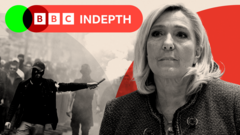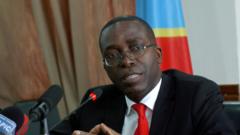In an unexpected turn of events, France's far-right landscape has been shaken by a court ruling banning Marine Le Pen from participating in the 2027 presidential elections, igniting a wave of indignation from her political allies. As reactions pour in, the legality and implications of the decision remain uncertain, posing critical questions for the National Rally (RN) and its future.
**Le Pen's Exclusion Stirs Controversy as French Far Right Lashes Out**

**Le Pen's Exclusion Stirs Controversy as French Far Right Lashes Out**
The disqualification of Marine Le Pen from the 2027 elections sparks outrage among far-right supporters, raising questions on its impact on future politics.
While outrage continues to ripple through right-wing circles, Le Pen's prognosis following the ban remains foggy. Her allies have decried the ruling as a blow to France’s democratic values. A notable deputy, speaking on national television, urged the public to share in the outrage. Yet, recent polling indicates a skeptical public response, with only 31% viewing the ruling as unjust, a stark contrast to her estimated 37% electoral support for the upcoming election.
Le Pen's ban stemmed from her involvement in a substantial fraud case regarding misuse of EU funds. The court's judgment reflects a systematic approach toward corruption, and its severity implies a diminished tolerance for political misdeeds, even from the far-right leaders who have previously criticized the establishment for lax accountability.
The decision has put the ruling coalition’s stability under scrutiny, with Prime Minister François Bayrou expressing concerns over a potential political upheaval. This leaves Le Pen and her party at a crossroads, as the tangible effects of this sentencing unfold in real-time. A pivotal question now looms over the RN's response within the parliament, weighing their options for revenge against the fragile coalition government.
In the wake of Le Pen's legal woes, Jordan Bardella emerges as a prominent potential successor. His growing popularity among younger voters highlights a shifting dynamic within the party, as he seeks to broaden its appeal beyond traditional demographics. With presidential elections two years away, the upcoming legal battles may pivot the RN's strategy significantly.
Additionally, amidst the turbulence of recent events, the RN strives to reshape its public image, distancing itself from ostensible radical affiliations. This recalibration may be critical as French voters grapple with their perceptions of democracy and accountability.
As the political tension escalates, the uncertain trajectory of the RN will undoubtedly have far-reaching implications for the future of French politics. Who will emerge victorious — the far-right champion facing legal battles or political institutions upholding accountability? Only time will reveal the consequences of this unforeseen judicial verdict.
Le Pen's ban stemmed from her involvement in a substantial fraud case regarding misuse of EU funds. The court's judgment reflects a systematic approach toward corruption, and its severity implies a diminished tolerance for political misdeeds, even from the far-right leaders who have previously criticized the establishment for lax accountability.
The decision has put the ruling coalition’s stability under scrutiny, with Prime Minister François Bayrou expressing concerns over a potential political upheaval. This leaves Le Pen and her party at a crossroads, as the tangible effects of this sentencing unfold in real-time. A pivotal question now looms over the RN's response within the parliament, weighing their options for revenge against the fragile coalition government.
In the wake of Le Pen's legal woes, Jordan Bardella emerges as a prominent potential successor. His growing popularity among younger voters highlights a shifting dynamic within the party, as he seeks to broaden its appeal beyond traditional demographics. With presidential elections two years away, the upcoming legal battles may pivot the RN's strategy significantly.
Additionally, amidst the turbulence of recent events, the RN strives to reshape its public image, distancing itself from ostensible radical affiliations. This recalibration may be critical as French voters grapple with their perceptions of democracy and accountability.
As the political tension escalates, the uncertain trajectory of the RN will undoubtedly have far-reaching implications for the future of French politics. Who will emerge victorious — the far-right champion facing legal battles or political institutions upholding accountability? Only time will reveal the consequences of this unforeseen judicial verdict.



















